

Business case. A business case captures the reasoning for initiating a project or task.
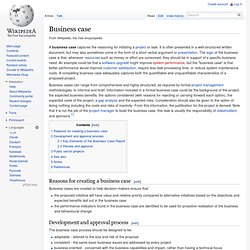
It is often presented in a well-structured written document, but may also sometimes come in the form of a short verbal argument or presentation. The logic of the business case is that, whenever resources such as money or effort are consumed, they should be in support of a specific business need. An example could be that a software upgrade might improve system performance, but the "business case" is that better performance would improve customer satisfaction, require less task processing time, or reduce system maintenance costs. A compelling business case adequately captures both the quantifiable and unquantifiable characteristics of a proposed project. Reasons for creating a business case[edit] Business cases are created to help decision-makers ensure that: Development and approval process[edit] The business case process should be designed to be:
Feasibility study. The feasibility study is an evaluation and analysis of the potential of a proposed project which is based on extensive investigation and research to support the process of decision making.
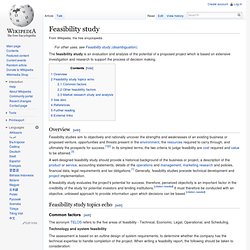
Overview[edit] A feasibility study evaluates the project's potential for success; therefore, perceived objectivity is an important factor in the credibility of the study for potential investors and lending institutions. [citation needed] It must therefore be conducted with an objective, unbiased approach to provide information upon which decisions can be based. [citation needed] Feasibility study topics echo[edit] Common factors[edit] Technology and system feasibility The assessment is based on an outline design of system requirements, to determine whether the company has the technical expertise to handle completion of the project. At this level, the concern is whether the proposal is both technically and legally feasible (assuming moderate cost).
Legal Feasibility Operational Feasibility Economic Feasibility. Project charter. In project management, a project charter, project definition, or project statement is a statement of the scope, objectives, and participants in a project.
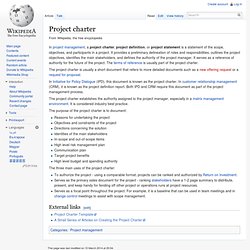
It provides a preliminary delineation of roles and responsibilities, outlines the project objectives, identifies the main stakeholders, and defines the authority of the project manager. It serves as a reference of authority for the future of the project. The terms of reference is usually part of the project charter. The project charter is usually a short document that refers to more detailed documents such as a new offering request or a request for proposal. In Initiative for Policy Dialogue (IPD), this document is known as the project charter. Project team. A project team is a team whose members usually belong to different groups, functions and are assigned to activities for the same project.
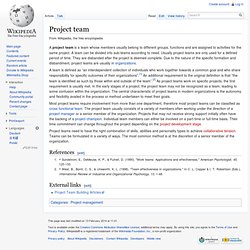
A team can be divided into sub-teams according to need. Usually project teams are only used for a defined period of time. They are disbanded after the project is deemed complete. Due to the nature of the specific formation and disbandment, project teams are usually in organizations. A team is defined as “an interdependent collection of individuals who work together towards a common goal and who share responsibility for specific outcomes of their organizations”.[1] An additional requirement to the original definition is that “the team is identified as such by those within and outside of the team”.[2] As project teams work on specific projects, the first requirement is usually met. Most project teams require involvement from more than one department, therefore most project teams can be classified as cross functional team. Project management office. A Project Management Office, abbreviated to PMO, is a group or department within a business, agency or enterprise that defines and maintains standards for project management within the organization.
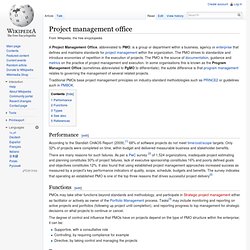
The PMO strives to standardize and introduce economies of repetition in the execution of projects. The PMO is the source of documentation, guidance and metrics on the practice of project management and execution. In some organisations this is known as the Program Management Office (sometimes abbreviated to PgMO to differentiate); the subtle difference is that program management relates to governing the management of several related projects. Traditional PMOs base project management principles on industry-standard methodologies such as PRINCE2 or guidelines such in PMBOK. Performance[edit] According to the Standish CHAOS Report (2009),[1] 68% of software projects do not meet time/cost/scope targets. There are many reasons for such failures.